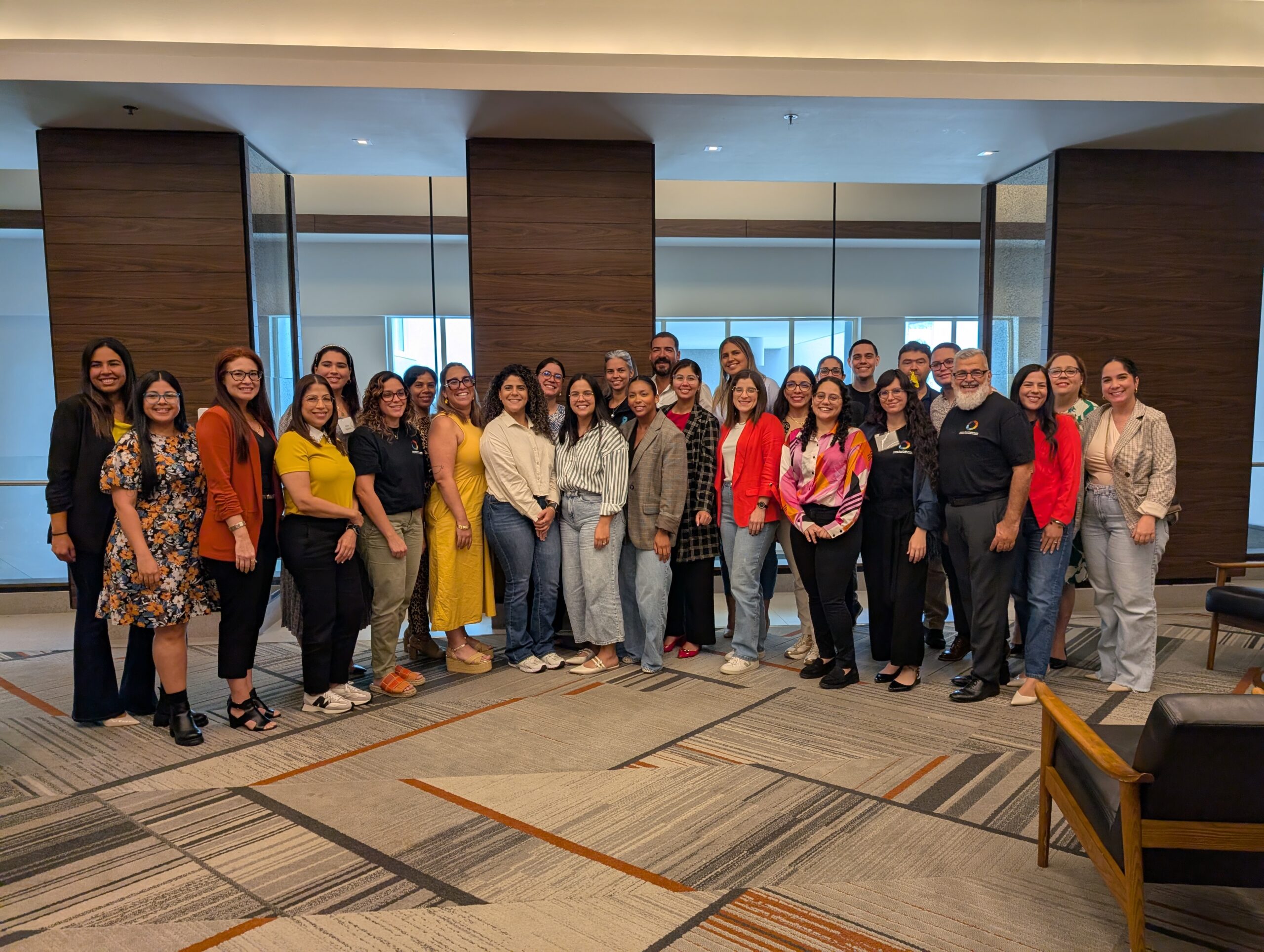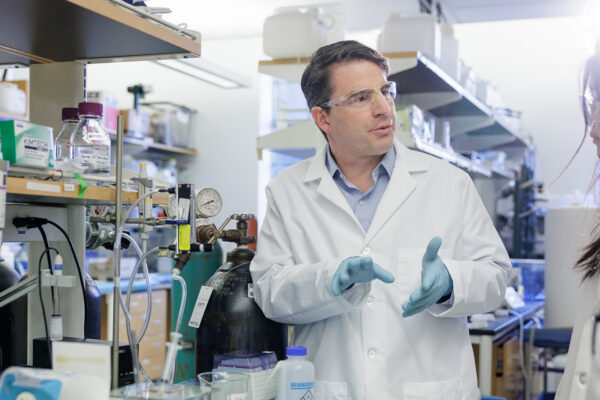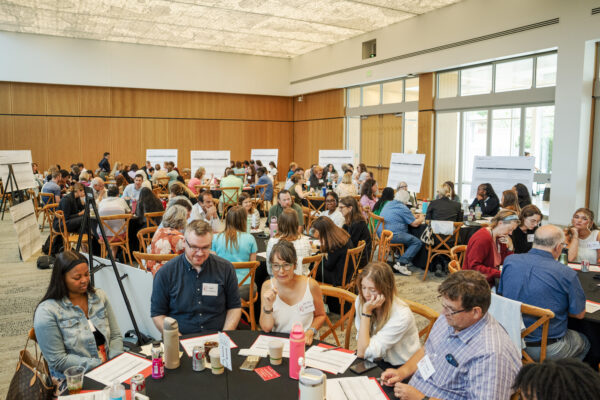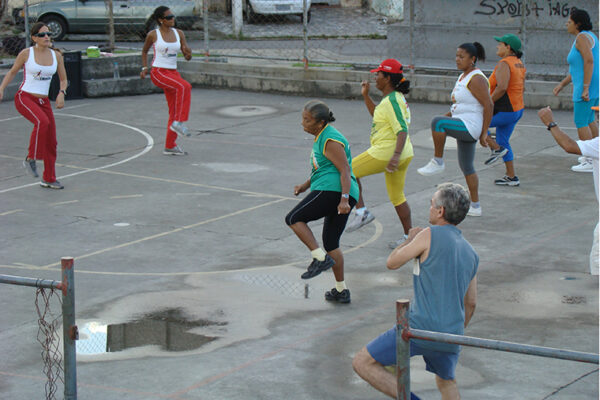For the first time, the Prevention Research Center (PRC) at Washington University in St. Louis has taken its signature Evidence-Based Public Health training program (EBPH) to a U.S. territory. This summer, the EBPH faculty delivered the course over three and half days in Caguas, Puerto Rico.
The EBPH program has been a cornerstone of the PRC’s work for more than two decades, reaching over 4,000 public health practitioners who have taken the course online or in person. Built around 10 interactive modules, the training mirrors many of the core elements of a master of public health curriculum while emphasizing practical tools that apply directly to the field. The program helps public health workers define problems, prioritize issues, evaluate programs and demonstrate return on investment.
This work matters because only 14% of the U.S. public health workforce holds a public health degree. Many professionals enter the field from other disciplines and may lack systematic training in evidence-based methods.
“We’ve designed this course to equip practitioners with competencies they can use right away — systems thinking to address complex problems, communication skills to turn scientific data into real-world narratives and resilience to weather uncertainty,” said Ross C. Brownson, the Steven H. and Susan U. Lipstein Distinguished Professor at the School of Public Health and PRC director. “It’s about giving frontline program implementers the confidence and capacity to apply evidence-based practices that improve health outcomes.”
Tailoring training
Puerto Rico’s connection to the EBPH began in 2023, when a small team from its Department of Health attended the in-person course in St. Louis. Impressed by its value, they encouraged broader participation. The Department of Health then applied to host the program and was selected.
Twenty-eight members of the Puerto Rico Department of Health participated in the EBPH course. The group included both seasoned practitioners and those who had no formal health training. To ensure accessibility, the course was offered with simultaneous translation — another program first.

“The training was an outstanding experience, providing great utility and benefit to all of us,” said Marianne Cartagena Colón, manager of the Center for the Coordination of Services for People Affected by Alzheimer’s Disease and assistant secretary for comprehensive health services at the Puerto Rico Department of Health.
The course was grounded in Puerto Rico’s recent challenges — Hurricane Maria in 2017, earthquakes in 2020, the COVID-19 pandemic and ongoing strains on the island’s electrical grid. By rooting exercises in these lived experiences, abstract concepts became tangible and applicable.
Cartagena Colón’s team found the modules on prioritization methods and return on investment (ROI) especially relevant.
“For a jurisdiction with limited resources, knowing how to identify and prioritize health issues and then demonstrate the value of our programs in ROI terms is absolutely critical,” she said. “It helps us make a stronger case for funding and ensures we are making the biggest impact possible with the resources we have.”
Her team already has begun using training tools to improve support programs for Alzheimer’s caregivers — a pressing need in Puerto Rico, where research suggests higher Alzheimer’s rates and mortality compared to the U.S. overall. The island has one of the oldest populations in the Americas, with median age around 45 years, compared with 39 in the U.S.
“The biggest public health challenges we face are the growing demand for access to health services for a population with rising rates of Alzheimer’s and other chronic diseases, and the constant need to maximize our available resources to meet these needs,” Cartagena Colón said. “This is a particularly difficult challenge for caregivers, who face significant obstacles in managing their own self-care while also navigating the complexities of their family member’s diagnosis.”
Her team drew on the interview guides module to create a structured way of talking with caregivers and health professionals. This process painted a clearer picture of caregivers’ specific challenges and priorities. Using the course’s prioritization and evaluation methods, they then ranked those needs, confirming that respite care and caregiver support were the most critical needs.
“We are using these findings to improve our services to be more evidence-based and responsive,” she said. “We can now move beyond reacting to problems and begin proactively designing programs that are both effective and justifiable from a resource standpoint.”
The PRC delivered the course in its train-the-trainer format, which prepares participants to tailor the training to local needs, replicate the course and extend its reach.
“We now have the capacity to share this knowledge with colleagues across the island, building a wider network of public health professionals equipped with these vital skills,” Cartagena Colón said. “I believe this will create a ripple effect, improving public health not just within our department, but across the entire island.”
Brownson emphasized that the model builds on several core implementation science strategies: expanding capacity through training, scaling up what works and creating a learning collaborative.
“We’ve evaluated this program extensively,” he said. “It builds skills, changes practice and strengthens public health systems. By training trainers, we’re helping to spread those benefits far beyond a single course.”
Cartagena Colón expressed gratitude for WashU’s investment in Puerto Rico’s workforce.
“The effort to provide an in-person, bilingual course shows a genuine commitment to supporting our public health professionals,” she said. “The course was truly a transformative experience for our team and for public health professionals in the Puerto Rico Department of Health.”
The EBPH training team includes faculty members Brownson, Stephanie Mazzucca-Ragan from the WashU School of Public Health, Anjali Deshpande from the University of Iowa College of Public Health and Kathleen Gillespie from the College for Public Health and Social Justice at Saint Louis University. Carol Brownson and Linda Dix serve as training coordinators. The course was supported by the National Association of Chronic Disease Directors, the Centers for Disease Control and Prevention and the Foundation for Barnes-Jewish Hospital.
This month, the PRC also is collaborating with the Austrian Society for Public Health to bring the program to Austria.


